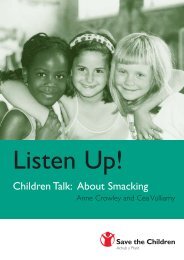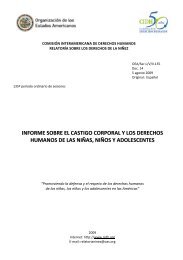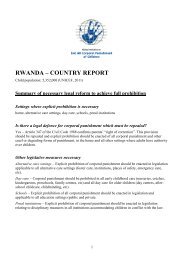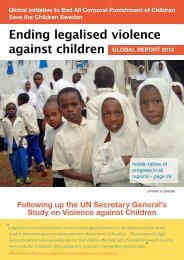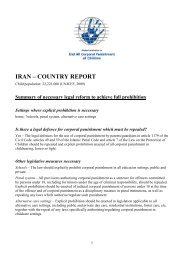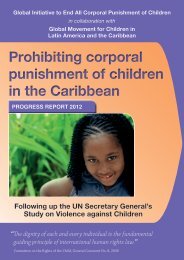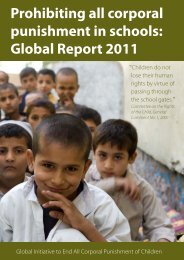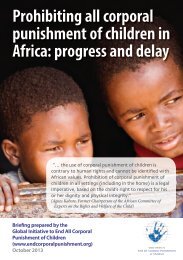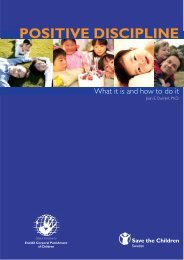Ending corporal punishment of children in Swaziland
Ending corporal punishment of children in Swaziland
Ending corporal punishment of children in Swaziland
- No tags were found...
Create successful ePaper yourself
Turn your PDF publications into a flip-book with our unique Google optimized e-Paper software.
Humiliat<strong>in</strong>g <strong>punishment</strong> is quite <strong>of</strong>ten meted out by foster parents, step parents,uncles and aunts. 33Children from low <strong>in</strong>come environments generally experience <strong>corporal</strong> <strong>punishment</strong>and other forms <strong>of</strong> humiliat<strong>in</strong>g and degrad<strong>in</strong>g <strong>punishment</strong> to a greater extent than<strong>children</strong> from high <strong>in</strong>come environments. In addition, qualitative data <strong>in</strong>dicates that<strong>punishment</strong>s tend to be particularly severe <strong>in</strong> the low <strong>in</strong>come environments. 34“It was alleged that I had <strong>in</strong>fluenced one boy to smoke and to dr<strong>in</strong>kalcohol so I was given 12 strokes on the buttocks. I was strangled first.Three teachers punished me, each giv<strong>in</strong>g me four strokes.”Boy, 13-18-year age groupIt is important to stress that, although this study has looked at <strong>children</strong> from different<strong>in</strong>come groups <strong>in</strong> <strong>Swaziland</strong>, there are factors other than <strong>in</strong>come that <strong>in</strong>fluencethe use <strong>of</strong> <strong>corporal</strong> <strong>punishment</strong> and other forms <strong>of</strong> humiliat<strong>in</strong>g and degrad<strong>in</strong>g<strong>punishment</strong> on <strong>children</strong>, such as relative levels <strong>of</strong> stress and, possibly, associatedrelationship problems.In general, <strong>corporal</strong> <strong>punishment</strong> is also used more frequently on younger <strong>children</strong>than on older <strong>children</strong>. Older <strong>children</strong> tend to experience humiliat<strong>in</strong>g and degrad<strong>in</strong>g<strong>punishment</strong> to a greater extent than younger <strong>children</strong>. 35The study found no statistically significant difference between the levels <strong>of</strong> <strong>corporal</strong>and humiliat<strong>in</strong>g <strong>punishment</strong> received by boys and girls, with the exception <strong>of</strong> olderboys who experience humiliat<strong>in</strong>g and degrad<strong>in</strong>g <strong>punishment</strong> at school more <strong>of</strong>tenthan girls. Qualitative data <strong>in</strong>dicates that girls are particularly prone to verbal abuse,as parents attempt to control perceived sexual activities <strong>of</strong> teenage girls. 36‘My uncle shouted at me that I was late and although I expla<strong>in</strong>edto him that I was from netball practice and gym. He threw a stone atme. I was able to dodge the stone. He also wanted me to comealong with him to school to prove that I was from the practice.He spoke bad words, say<strong>in</strong>g that it is possible that I was with boys atschool and I am ly<strong>in</strong>g that I was at practice. ”Girl, 13-18-year age groupIf <strong>children</strong> themselves could chose, they would prefer to be discipl<strong>in</strong>ed <strong>in</strong> a nonviolentand non-humiliat<strong>in</strong>g manner. On average 77% <strong>of</strong> the <strong>children</strong> questioned <strong>in</strong>the survey found <strong>corporal</strong> <strong>punishment</strong> unacceptable <strong>in</strong> both the home and at school.The sentiment was the same towards humiliat<strong>in</strong>g <strong>punishment</strong>, which approximately81% <strong>of</strong> the <strong>children</strong> found unacceptable. 37The overwhelm<strong>in</strong>g majority <strong>of</strong> <strong>children</strong> would like parents and teachers to talk tothem and expla<strong>in</strong> what they did wrong <strong>in</strong>stead <strong>of</strong> us<strong>in</strong>g <strong>corporal</strong> <strong>punishment</strong> andother forms <strong>of</strong> humiliat<strong>in</strong>g and degrad<strong>in</strong>g <strong>punishment</strong>. Accord<strong>in</strong>g to the study, 82%<strong>of</strong> the <strong>children</strong> would like adults to talk to them, 10% <strong>of</strong> the <strong>children</strong> would prefer15



